Zishu Wei
GAIR: GUI Automation via Information-Joint Reasoning and Group Reflection
Dec 10, 2025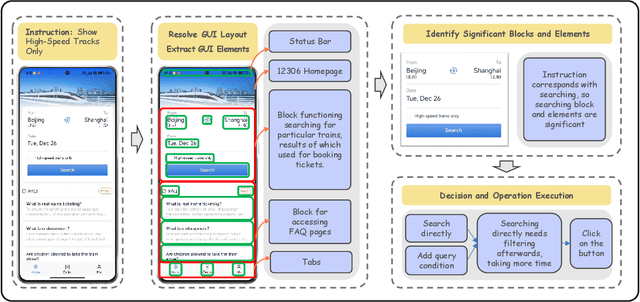
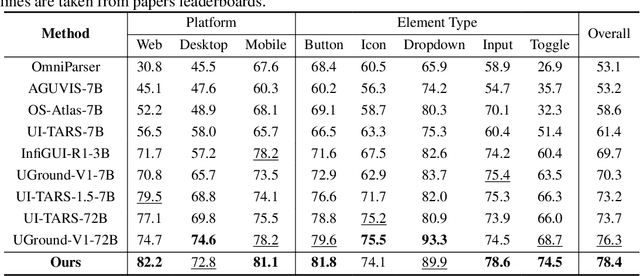
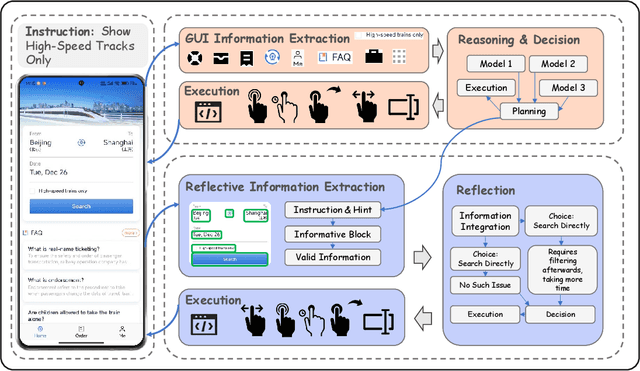
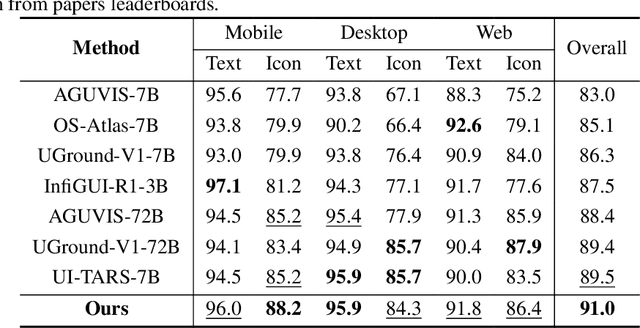
Abstract:Building AI systems for GUI automation task has attracted remarkable research efforts, where MLLMs are leveraged for processing user requirements and give operations. However, GUI automation includes a wide range of tasks, from document processing to online shopping, from CAD to video editing. Diversity between particular tasks requires MLLMs for GUI automation to have heterogeneous capabilities and master multidimensional expertise, raising problems on constructing such a model. To address such challenge, we propose GAIR: GUI Automation via Information-Joint Reasoning and Group Reflection, a novel MLLM-based GUI automation agent framework designed for integrating knowledge and combining capabilities from heterogeneous models to build GUI automation agent systems with higher performance. Since different GUI-specific MLLMs are trained on different dataset and thus have different strengths, GAIR introduced a general-purpose MLLM for jointly processing the information from multiple GUI-specific models, further enhancing performance of the agent framework. The general-purpose MLLM also serves as decision maker, trying to execute a reasonable operation based on previously gathered information. When the general-purpose model thinks that there isn't sufficient information for a reasonable decision, GAIR would transit into group reflection status, where the general-purpose model would provide GUI-specific models with different instructions and hints based on their strengths and weaknesses, driving them to gather information with more significance and accuracy that can support deeper reasoning and decision. We evaluated the effectiveness and reliability of GAIR through extensive experiments on GUI benchmarks.
OS Agents: A Survey on MLLM-based Agents for General Computing Devices Use
Aug 06, 2025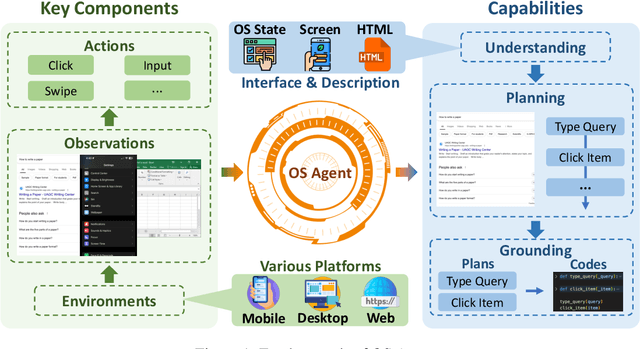
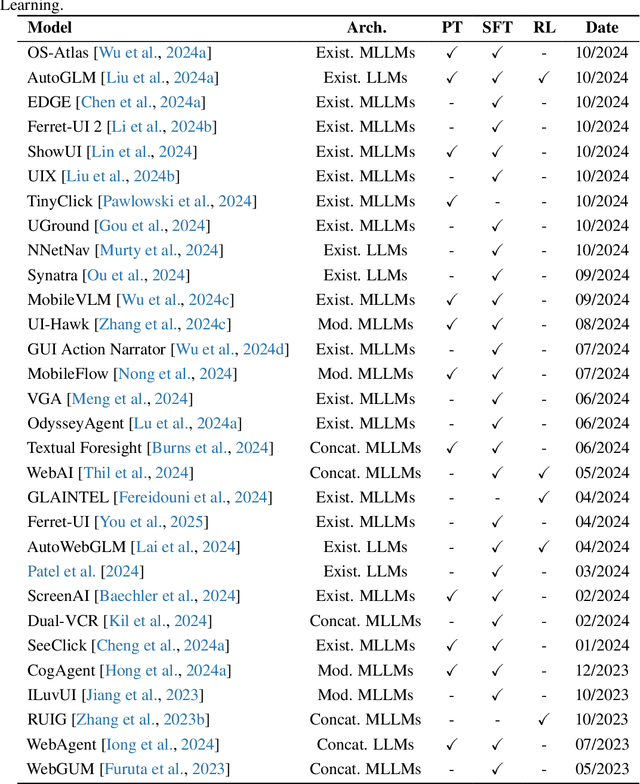
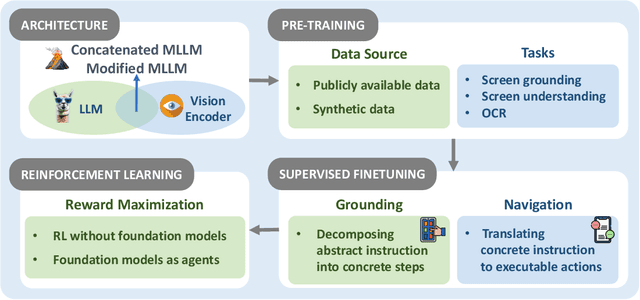
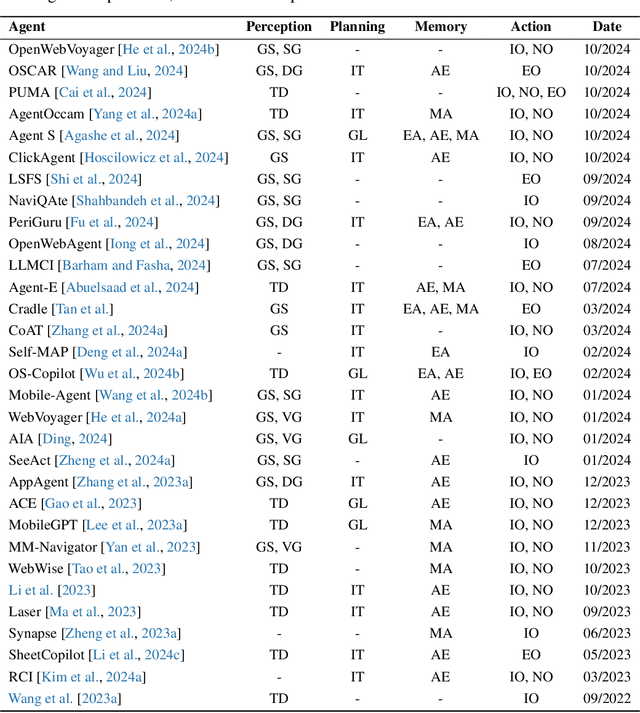
Abstract:The dream to create AI assistants as capable and versatile as the fictional J.A.R.V.I.S from Iron Man has long captivated imaginations. With the evolution of (multi-modal) large language models ((M)LLMs), this dream is closer to reality, as (M)LLM-based Agents using computing devices (e.g., computers and mobile phones) by operating within the environments and interfaces (e.g., Graphical User Interface (GUI)) provided by operating systems (OS) to automate tasks have significantly advanced. This paper presents a comprehensive survey of these advanced agents, designated as OS Agents. We begin by elucidating the fundamentals of OS Agents, exploring their key components including the environment, observation space, and action space, and outlining essential capabilities such as understanding, planning, and grounding. We then examine methodologies for constructing OS Agents, focusing on domain-specific foundation models and agent frameworks. A detailed review of evaluation protocols and benchmarks highlights how OS Agents are assessed across diverse tasks. Finally, we discuss current challenges and identify promising directions for future research, including safety and privacy, personalization and self-evolution. This survey aims to consolidate the state of OS Agents research, providing insights to guide both academic inquiry and industrial development. An open-source GitHub repository is maintained as a dynamic resource to foster further innovation in this field. We present a 9-page version of our work, accepted by ACL 2025, to provide a concise overview to the domain.
Optimize Incompatible Parameters through Compatibility-aware Knowledge Integration
Jan 10, 2025



Abstract:Deep neural networks have become foundational to advancements in multiple domains, including recommendation systems, natural language processing, and so on. Despite their successes, these models often contain incompatible parameters that can be underutilized or detrimental to model performance, particularly when faced with specific, varying data distributions. Existing research excels in removing such parameters or merging the outputs of multiple different pretrained models. However, the former focuses on efficiency rather than performance, while the latter requires several times more computing and storage resources to support inference. In this paper, we set the goal to explicitly improve these incompatible parameters by leveraging the complementary strengths of different models, thereby directly enhancing the models without any additional parameters. Specifically, we propose Compatibility-aware Knowledge Integration (CKI), which consists of Parameter Compatibility Assessment and Parameter Splicing, which are used to evaluate the knowledge content of multiple models and integrate the knowledge into one model, respectively. The integrated model can be used directly for inference or for further fine-tuning. We conduct extensive experiments on various datasets for recommendation and language tasks, and the results show that Compatibility-aware Knowledge Integration can effectively optimize incompatible parameters under multiple tasks and settings to break through the training limit of the original model without increasing the inference cost.
InfiGUIAgent: A Multimodal Generalist GUI Agent with Native Reasoning and Reflection
Jan 08, 2025Abstract:Graphical User Interface (GUI) Agents, powered by multimodal large language models (MLLMs), have shown great potential for task automation on computing devices such as computers and mobile phones. However, existing agents face challenges in multi-step reasoning and reliance on textual annotations, limiting their effectiveness. We introduce \textit{InfiGUIAgent}, an MLLM-based GUI Agent trained with a two-stage supervised fine-tuning pipeline. Stage 1 enhances fundamental skills such as GUI understanding and grounding, while Stage 2 integrates hierarchical reasoning and expectation-reflection reasoning skills using synthesized data to enable native reasoning abilities of the agents. \textit{InfiGUIAgent} achieves competitive performance on several GUI benchmarks, highlighting the impact of native reasoning skills in enhancing GUI interaction for automation tasks. Resources are available at \url{https://github.com/Reallm-Labs/InfiGUIAgent}.
 Add to Chrome
Add to Chrome Add to Firefox
Add to Firefox Add to Edge
Add to Edge